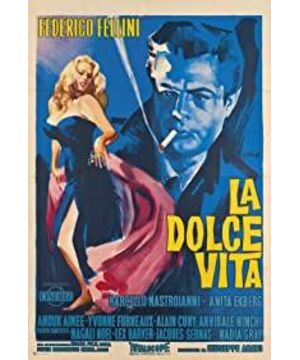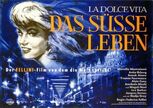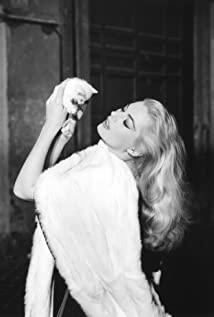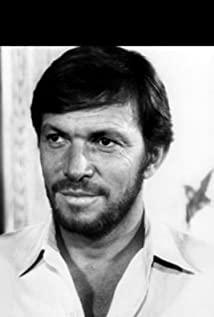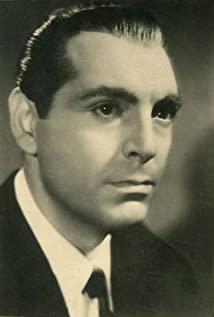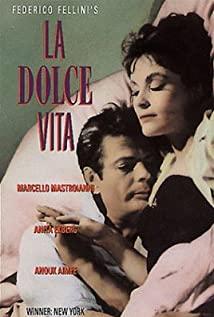Fellini's La dolce vita (1960) is one of them, even if they are hailed as classics of film history. one. In addition to being able to stand the baptism of time because of its shooting techniques, the charming performances of the actors, and the still fashionable and eye-catching costumes in the film, "Dew Drops and Peony" also touches the human spirit because of its theme/core. The pain from above will make us feel the same experience in the present moment.
Fellini's "Peonies Open with Dewdrops" marks his further shift from the neo-realist style to " Eight and a Half ", "Giulietta degli spiriti", etc., exploring the inner level of the protagonist, or showing a gorgeous and exaggerated vision. . In the finale of his "Neo-Realist" stage, "Le notti di Cabiria" (Le notti di Cabiria, 1957), Fellini "connects" with "Peonies with Dewdrops". "Flower Street Dream", described by French film critic Andre Bazin as "the most courageous and powerful scene in Fellini's films", expresses the heroine's thirst for love. This film is detached from the "simple movie"[i] (a movie that ends with the end of the story), and contains a moving that can be reminiscent. Similarly, the male protagonist of "Dewdrops and Peonys" is also eager to be loved. His final change is similar to the ending of "Flower Street Spring Dream" - the reality is still depressing and disappointing, but he is aware of his "existence" and Came out from the fall of the night and greeted the dawn (the night and the morning in "Dew Drops of Peony Bloom" constantly alternate).
The beginning of this film can be listed as one of the most memorable openings in film history - a helicopter flying over Rome with a statue of Christ hanging, symbolizing the "hanging away" of traditional beliefs and morals, ushering in the It is the "sweet" life of the male protagonist and four sunbathing beauties flirting with each other. As many film critics have put forward a similar point of view: the changes of the times have led to changes in the style of Fellini's works, "Dew Drops and Peony" reflects that Italy is slowly recovering from the trauma of World War II, despite the life of the local people. Gradually become rich, but spiritually, whether it is the upper class (represented by the hero's friend Steiner and lover Maddalena, etc.), the middle class (represented by the hero), or the people in the lower class who are crazy because of the "Appearance of Our Lady", All appear more and more empty, depraved and ignorant. Marcello, the male protagonist, is not really interested in "The Virgin", but he is addicted to the plump, hot and sexy movie star Sylvia (played by Anita Ekberg) who is like a Marilyn Monroe, but he keeps following Sylvia around Rome. , and the maddened believers who were led in circles by two children who claimed to have seen the apparition of the Virgin Mary.
Sylvia, who fascinates all beings, is the "Virgin" of the male protagonist Marcello. A similar female image also appeared in "Eight and a Half" after Fellini - the white muse played by Claude Catina . In "Eight and a Half", combined with Jung's collective unconscious, the ideal goddess Claudia is used as the anima projection of Guydo (no matter in the unconsciousness of men and women, there seems to be another character of the opposite sex lurking behind, and every man should also have own anima); and similar projections may have already begun to appear in this "Dew Drop Peony". I can boldly say that Maddalena, played by Anouk Aimée, is the "projection" of the hero Marcello. Although Maddalena is beautiful and wealthy, she is just as lonely as Marcello, and just as intolerant of loneliness - as a celebrity, she doesn't mind A street prostitute is a guest in the shabby house, and while she and the male protagonist are having a conversation in the castle, she can't help flirting with another man (the male protagonist who already has a cohabiting girlfriend is also flirting with flowers everywhere).
Marcello, who dreams of becoming a writer, has no choice but to become a down-to-earth reporter, reporting trivial gossip news (Paparazzi in English for "paparazzi" is derived from Paparazzo, a photographer character in the film, and Marcello sometimes even He himself despised his peers or profession). Introduced by his friend Steiner, Marcello had the opportunity to realize his ideal, but because of his friend's suicide, his dream of being a writer was also disillusioned. Marcello's ideal failed, and when he was about to kiss with the sexy movie star Sylvia in the famous Roman Trevi (Fontana di Trevi), the sound of the water suddenly stopped, the sky suddenly brightened, and the kiss between Marcello and Sylvia was also interrupted , has a subtle connection; what he hoped for in the film has been unable to be realized again and again, so that the pillar supporting his spirituality seems to be gradually corroded.
I used to be more interested in the stewardess next to Sylvia, and laughed at Marcello, who was like a "empty doll", but she couldn't help but fall in love with Sylvia, and said the famous Italian love sentence - "You was the first woman on the first day of God's creation." His change from despising Sylvia to looking up to her was vividly expressed in the paragraph when Marcello followed Sylvia and went to the dome of St. Peter's Basilica. In Marcello's mind, Sylvia has changed from an "empty doll" to a perfect synthesis like a mother, lover, sister, friend, angel, etc., which can also imply Marcello's fall, or the "collapse" of his beliefs. This echoes his later abandonment of writing (which is already reflected in the scene in the restaurant by the sea where Marcello doesn't want to type anymore), to his transformation into an advertiser. Marcello, who had lofty ideals in the past, still has to follow the trend and become more and more "superficial", making him a cohabitation girlfriend who he looked down upon in the past, or who only recognizes appearances and is easily hypnotized by deceitful religious rituals. Not much difference.
After Marcello returns to Rome from the sea, his father makes a surprise visit (Annibale Ninchi, who played the role of his father, went on to play the father of the hero Guydo in 1963's "Eight and a Half"). Follow Marcello to a nightclub with his father and photographer Paparazzo (young Paparazzo, mature Marcello and older father, three representing the future, present and past). And as soon as they entered the nightclub, they saw clown characters and elements of the circus, which are often seen in Fellini films. Marcello's father, despite his age, is charming and humorous; he becomes a bright spot that makes Marcello sometimes overshadowed by his father's light, and highlights Marcello's loneliness, or when his father is performing with the woman The incompatibility between the characters (both Sylvia and Steiner, both have their own light like the hero's father, making Marcello feel dejected). The part of my father's visit was first harmonious and happy, and then filled with sadness due to my father's illness and leaving Rome alone (in the nightclub, the performance of the clown playing the trumpet has been "announced" in advance). Marcello tries to reconnect with his father, but fails, and this passage seems to push Marcello down again, making him even more depressed and dejected.
At night, on the streets of Veneto again, Marcello was taken by a group of dudes/players to an ancient castle in the suburbs. It turned out that this night was the invitation of the prince, the descendants of the fallen nobles, and the celebrities representing the emerging bourgeoisie. Then it flew over the then-modern, under-construction building) for a revelry. Everyone dressed gorgeously, and went to the castle at night to explore, explore, and play games of conjuring and exchanging partners. And the solemnity of the castle itself may have a sense of horror, which is broken by their indulgence, which is similar to the scene of Marcello and Sylvia in St. Peter's Basilica, which is an important symbol of the Catholic Church (meaning Marcello or the lack of faith in modern people, My mind only has sexual fantasies about the big wave of women), and I take care of it (but when Steiner encourages Marcello not to forget his previous literary dreams, the church building they are in, and Steiner's Baja "Toccata and Fugue in D minor" played , but it can wash people's thoughts and make the divine brilliance/time reappear).
Towards the end of the film, it was another night of rotten partying. Everyone celebrated Nadia's freedom to be single again, and someone suggested that she go to dance to cheer her up. Marcello in this scene is completely degraded, because he can't get rid of his deep helplessness about life, so he can only go for fun and even do crazy behaviors - she rides on women, like a circus The animal trainer of the regiment; he changed from the role of being "pressed" and dominated by the presence of Sylvia, Steiner or his father in the past, to the role of being pressed and dominated by others! But even so, after a night, Marcello was still surrounded by a sense of powerlessness or loss like the dawn/morning time before; and the satire of the depravity of modern people in the film, at this time, once again turned into sympathy for them! At the end of the movie, Marcello and others are watching a strange fish with no signs of life by the sea. This scene may symbolize the death of faith; then, the little girl in the restaurant by the sea reappears, and she greets Marcello like an angel; One scene, which corresponds to the failure of communication between Marcello and the sexy girl on the roof at the beginning, highlights the impact of the changing times (Marcello and his father also have a gap between them).
Fellini's "Dewdrops and Peonies", along with Gundam's "Out of breath" or other early New Wave works, kicked off the turbulent 1960s with their constantly moving shots that differentiated the black and white films of the past. And the shots of this film, as Fabrizio Borin, a professor of film history, said, "sometimes stand on the sidelines, sometimes condescending, and sometimes they are at the center of the event." They move like paparazzi, allowing the audience to focus more on the characters and creating a circus-like lively and chaotic atmosphere. In addition, we certainly can't forget that when Marcello and Sylvia were about to kiss in the Trevi Fountain, the camera suddenly switched from close-up to long-range, and the night suddenly turned into a genius stroke in the morning; and I can't forget Marcello and his live-in girlfriend arguing in the suburbs Before, the contrast between the big searchlight on the road and the dark night creates a mysterious effect (as shown in the figure below).
The seemingly scattered film has a puzzle-like structure, and many paragraphs can be made into separate chapters without much connection with the story before and after. However, such a collage may be closer to "life" itself, and our usual experiences of the previous moment and the next moment often do not have a necessary logical relationship. In this film, Fellini began to abandon the linear narrative and paved the way for the later more stream-of-consciousness "Eight and a Half"; he demonstrated to us what it means to cohesion under the scattered - through different passages, but they point together, wandering in the Marcello and modern people in the lost city, the spiritual level of the void wrapped and covered by the "sweet" life, or the constant decay inside ("Dew Drops of Peony" and Antonioni's "Love", both have this close kernel). The famous film critic Roger Ebert pointed out: "This film is composed of a series of declines and rises"; and I think such "up and down" may represent some struggles or upward pursuits of the characters in the film, but In the end, they will still fall into a sadness that cannot be "saved" by the carnival.
Going back to what I said at the beginning of this article, "Dewdrops and Peonys" can still last for a long time. A big reason is that we can still find resonance in the character of Marcello. In day-to-day life, are you getting further and further away from your ideals? Are you still unable to get out of the desert of melancholy by buying your favorite, "relieving your sorrow" through alcohol, and through entertainment? Even after more than a year of struggle, Hong Kong people who are constantly disappointed and lost, but can only anesthetize themselves in other ways, will they have a different experience with this film? This film touches on the feeling of loneliness that we always want to suppress. It allows it to "ferment", or be released and spread. Instead, we feel that we are no longer floating in nothingness, no longer "gradually tamed". I have to remember to cry", just like Marcello's state in the early morning, although he looked tired and lonely, and although he would continue to pursue futile pleasures, at that time he temporarily awakened from his sweet dream and "lived" again. come over.
—————————————————————
[i] From "Federico Fellini" By Fabrizio Borin, Carla Mele
View more about The Sweet Life reviews


